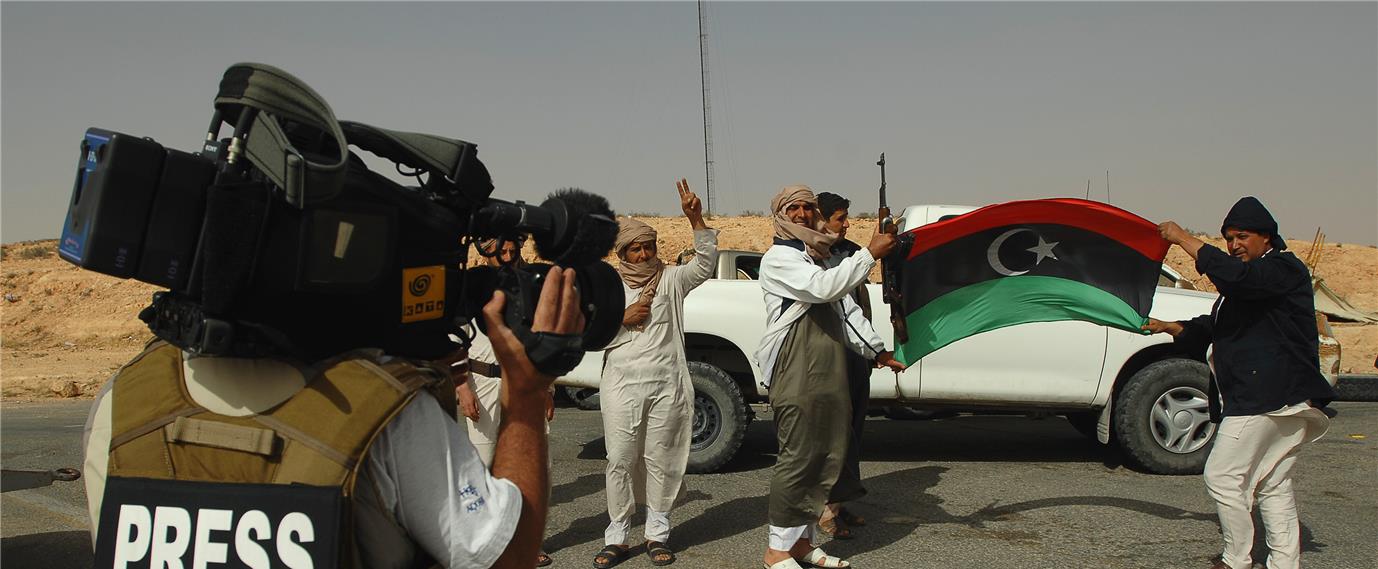بعد أكثر من أربعين عاماً من الإهمال المتعمد للإعلام في ليبيا، الذي كانت فيها كل وسائله مجرد أبواقٍ للنظام وأفكاره -رغم محاولات الإصلاح في مشروع ليبيا الغد- جاءت ثورة فبراير لتشكل بصيص أمل وحلم لكل الصحفيين لبدء مشاريع إعلامية حقيقية مهنية ومستقلة في البلاد.
لكن سرعان ما تحول هذا الحلم إلى كابوس مفزع، وتحولت الكثير من المنابر الإعلامية إلى منصات لمهاجمة الخصوم السياسيين والتشهير بهم، بل حتى الكذب في حقهم للنيل منهم في الكثير من الأحيان. بعض القنوات الإعلامية - إن صح الوصف - لم تكتفِ بالتلميح على خصومهم، بل وصل بها الحد إلى ذكر الأشخاص بأسمائهم الكاملة ووصف أماكن سكنهم وعملهم وتحريض الناس على مهاجمتهم بتهم مختلفة، هذا الانفلات غير المهني والإجرامي تسبب في عمليات قتل وتهجير وحرق وهدم منازل العديد من الليبيين.
تحريض
خطاب الكراهية عبر وسائل الإعلام في ليبيا خلال السنوات القليلة الماضية ارتفع بشكل كبير، ولعب الإعلام دورا كبيرا ومؤثرا في الاقتتال الذي تعيشه البلاد
المركز الليبي لحرية الصحافة في ليبيا حذر في أكثر من مناسبة من خطورة تنامي "خطاب الكراهية" مشدداً على أن الصحفيين الذين يشاركون في مثل هذه الاختلالات المهنية معرضين للمحاسبة القانونية.
وفي هذا الصدد يقول رئيس المركز محمد الناجم: "إن التحدي الحقيقي أمام مالكي وسائل الإعلام ورؤساء التحرير هو إجراء الإصلاحات الشاملة في السياسات التحريرية ووقف هذا الخطاب المشبوه بحجج محاربة الإرهاب أو شعارات الثورة وغيرها، وعلينا جميعا العمل على الإصلاح الهيكلي والقانوني للقطاع بعد الانهيار والسقوط الذي يُعانيه، ولعل هذه النتائج بالدراسة البحثية هي لتعزيز دفاعات المجتمع وتوعيته بما يدور من حوله جراء الإخلالات المهنية التي تُرتكب بالفضاء العام".
وأكد المركز خلال تقاريره لرصد هذه الإخلالات المهنية عن الحاجة الملحة لتوعية رؤساء التحرير ومديري القنوات التلفزيونية بخطورة خطاب الكراهية والتحريض وتداعياته على المجتمع، ناهيك عن مدى تغول أصحاب النفوذ وتحكمهم بالسياسات التحريرية والمحتوى البصري وعدم احترام الأعراف المهنية.
كما يرى المركز الليبي ضرورة الفصل بين هيئات التحرير ومالكي وسائل الإعلام وتشجيع الصحفيين على تشكيل هيئات تحرير تحترم أخلاقيات المهنة.
أعمال إجرامية
غير أن الأمر في ليبيا تجاوز التحريض وخطاب الكراهية الذي يتحدث عنه المركز، بل وصل الأمر إلى تورط العديد من الصحفيين في أعمال غير أخلاقية بعيدة كل البعد عن العمل الصحفي، لتجد بعضهم مشاركا في عمليات التحقيق مع المعتقلين بل وحتى تعذيبهم بحسب شهادات بعض من تم الإفراج عنهم.
أبعد من ذلك، نقلت بعض القنوات عمليات استجواب لمتهمين على الهواء من قبل من يسمون أنفسهم إعلاميين، وهناك برامج أسبوعية تعرض شهادات واعترافات المعتقلين -رغم أن القوانين الدولية تجرم عرض المتهمين عبر الإعلام- ويقوم بتقديم هذا البرنامج الأسبوعي أحد الصحفيين المعروفين والذي يقدم نفسه على أنه مراسل حربي، وقد وثقت بعثة الأمم المتحدة في ليبيا بعض هذه الحلقات وخصوصاُ أنها عرضت اعترافات بعض الأشخاص الذين هم تحت السن القانونية.
كما أن بعض المتهمين الذين ظهروا في حلقات بُثت فيها اعترافاتهم وجدت جثثهم وقد ألقيت في مكبات للقمامة.
ظهر "ع ب" -أتحفظ عن ذكر اسمه حفاظاً على سلامة أهله- في إحدى الحلقات منذ ثلاث سنوات وهو شاب لم يتجاوز الثمانية عشر عاماً، ظهر في فيديو يعترف بقتله ثلاثين شخصاً دون أن يذكر أسماء الذين قتلهم، كما أن مكان التصوير كان مظلما وغير واضح ، وقد بدا الشاب منهكاً وخائفاً.
أهل هذا الشاب حتى الآن -رغم مرور أكثر من ثلاث سنوات- لم يعرفوا مصير ابنهم رغم بحثهم عنه في كل السجون التي من المفترض أن القناة الذي بثت هذا الفيديو تابعة لها، كما أن هذه القناة حذفت مشهد اعتراف الشاب بعد عدة أيام ولم تُعد نشره من جديد، وباءت كل محاولات الأهل في التواصل مع القناة أو الإعلامي الذي بث هذا المشهد بالفشل.
الإفلات من العقاب
الإفلات من العقاب فاقم من تفشي هذه الظاهرة، وبات كل الصحفيين المشاركين في هذه العمليات يفعل ما يشاء ويقول ما يريد دون أي مسؤولية، البعض منهم في الحقيقة من الشباب صغار السن المتحمسين الذين لا دراية لهم بالقوانين الدولية التي تجرم هذه الأعمال وليس لديهم أي خلفية تاريخية بالنهائيات المأساوية للذين سبقوهم في ارتكاب مثل هذه الجرائم.
نظرة واحدة على كل التجارب السابقة وعلى القوانين الدولية ستجعل من هذا الصحفي يعيد حساباته ألف مرة قبل أن تخرج منه أي كلمة، إذ لا يكفي الاعتماد على الزازعين الديني والأخلاقي لضبط الأمور.
تجارب تاريخية
"تعرفون ماذا يجب أن نفعل بالصراصير؟" ستّ كلمات قالها مذيع راديو "التلال الألف" المحلي في رواندا صباح الخميس 7 أبريل/نيسان عام 1994، أطلقت شرارة إحدى أسوأ مجازر الإبادة الجماعية في التاريخ.
فور اغتيال الرئيس "هابياريمانا" سارعت الإذاعة إلى اتهام أقلية التوتسي والتي كان الإعلام يطلق يسميهم "الصراصير التوتسي"، فانطلقت حملة تطهير عرقي واسعة، شارك فيها الجيش وميليشيات قبائل الأغلبية "الهوتو" بل وحتى المواطنون العاديون قتلوا جيرانهم من التوتسي. استمرت المجازر 100 يوم تقريبا، وأدت إلى قتل حوالي مليون شخص من أقلية التوتسي، واغتصاب 250 ألف امرأة، إضافة إلى ملايين المصابين والمشردين.
وفي عام 2003 أي بعد تسع سنوات من المجازر أدانت المحكمة الجنائية الدولية وزير الإعلام وقت المجزرة وأربعة إعلاميين بتهمة التحريض على الإبادة الجماعية، منهم مذيعان من "التلال الألف" حكم عليهما بالسجن المؤبد.
الأكيد أن غياب المعايير الدقيقة للإعلام في ليبيا وعدم وجود أي مجلس وطني أعلى للإعلام وافتقاد التشريعات المناسبة وسيطرة الشخصيات النافذة على غرف أخبار العديد من القنوات الإعلامية، وجعلها مجرد منابر لتمجيد البعض ومهاجمة الخصوم بمختلف الوسائل غير الأخلاقية، أسهم بفاعلية في انتشار خطاب الكراهية في الإعلام الليبي بشكل واسع، كما لا يخفى علينا غياب دور المؤسسات القانونية والقضائية في البلاد، ما جعل من هؤلاء الصحفيين يظنون أنهم بعيدون عن العقاب والمحاسبة.








































